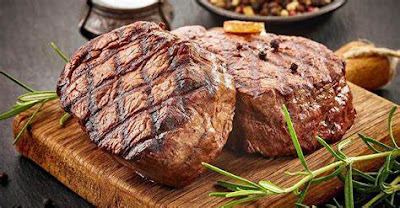The Carnivore Diet: Can You Have Too Much Meat?
Yes, you certainly can!
There are many different types of diet plans, and the carnivore diet is one that is currently popular. You could worry if it's healthy to consume only meat, even though it might brag results in helping you drop a few pounds (perhaps gained during quarantine?). And how does the carnivore diet differ from other meal plans that restrict carbohydrate intake, such the ketogenic (keto) diet?
Dietitian Kate Patton, MEd, RD, CSSD, LD, outlines the carnivore diet and discusses if eating too much meat is feasible.
Carnivore Diet:
If you consume meat at every meal because you like it so much, the carnivore diet may seem like the perfect solution (hello, Ron Swanson). You consume meat or animal products at every meal when following this diet. The carnivore diet strives for a daily carb intake of zero, in contrast to keto, which has a daily carb intake cap. You exclude all other dietary categories, such as grains, legumes, vegetables, fruits, nuts, and seeds, and only consume meat, fish, eggs, and certain other animal products.
The carnivore diet claims to promote mood improvement, weight loss, and blood sugar control. Its foundation is the idea that high-carbohydrate diets are what lead to chronic illness. However, there are disadvantages to consuming only animal protein and no carbohydrates.
Carbs are given a poor rap. Your body converts carbohydrates into glucose during digestion so that you may use it as fuel. However, if you don't go out frequently to burn those carbohydrates, they can easily turn into fat. Therefore, consuming too many carbohydrates might cause weight gain rapidly.
According to Patton, "Your body prefers carbohydrates because that's what it's used to consuming for energy." But if you don't consume carbohydrates, you can also burn fat. And that results from burning the fat in your own body or the fat in the meals you eat. She claims that once off of carbohydrates, people often feel better since their blood sugar levels don't fluctuate wildly and eating meat is not as inflammatory. She does, however, issue a warning: Additional inflammatory effects of excessive animal fat.
Despite the fact that carbohydrates are your body's main energy source, Patton claims that the absence of carbohydrates is what causes the weight reduction linked with the carnivorous diet. A diet consisting only of meat might also have some very negative side effects.
Not all carbs are equal or bad:
In their purest form, carbohydrates provide your body energy. Additionally, there are several healthy carbs that are rich in fibre, vitamins, and minerals. The carbohydrates that are closest to how they naturally exist — unprocessed or unrefined — are the greatest. Some to think about are:
- fruits, including strawberries, apples, and pineapple.
- vegetables, including beets, carrots, and sweet potatoes.
- healthy grains, including whole wheat bread and quinoa.
Avoid simple carbohydrates, which include sweets, sweet candies, cakes, and pies. These are frequently loaded with preservatives, white sugar, and wheat and are well-known for promoting inflammation and weight gain, particularly around your midsection. Additionally, these carbohydrates have been linked to a number of harmful medical issues, including Type 2 diabetes (which causes fluctuations in blood sugar), obesity, and high blood pressure. Therefore, if you eliminate them from your diet, you will undoubtedly feel better with less weight and stable blood sugar levels. To reap the health advantages, however, you do not have to completely avoid carbohydrates. In fact, doing so has the potential to seriously harm your health. fruit varieties including apples, pineapple, and strawberries, vegetables, including beets, sweet potatoes, and carrots. complete grains, such as quinoa and whole wheat bread.
Risks of the carnivore diet?
The mainstay of the carnivorous diet is rigorous restriction. There will always be repercussions when you cut out whole food categories from your diet.
The carnivorous diet is extremely low in fiber, which Patton claims will result in significant constipation. And the dangers grow considerably worse than an untimely bowel movement.
As Patton puts it bluntly, "you should certainly not try this diet if you have a pre-existing chronic illness, including high blood pressure, high cholesterol, any history of stroke or other cardiovascular disorders." Even if you have digestive problems, this diet might aggravate them because of the abundance of protein and fat, which take much longer to digest.
The high saturated fat content of the carnivorous diet increases your risk of heart disease by raising your LDL or "bad" cholesterol. In addition, a variety of processed meats, including bacon and various lunch meats, are high in salt and may increase the risk of developing some forms of cancer. Furthermore, renal issues and high blood pressure might result from a sodium-rich diet.
Should you consider the carnivore diet?
When answering this query, Patton is unambiguous.
"No, in my opinion."
This diet is not for you if you feel that everything should be consumed in proportion. A balanced diet that includes a range of foods from several dietary categories is the healthiest.
Finding a balance in what is best for you truly is the key.


Comments
Post a Comment